Bill Surname Ancestry ResultsOur indexes 1000-1999 include entries for the spelling 'bill'. In the period you have requested, we have the following 328 records (displaying 51 to 60): Single Surname Subscription | | | Buying all 328 results of this search individually would cost £1,820.00. But you can have free access to all 328 records for a year, to view, to save and print, for £100. Save £1,720.00. More... |
These sample scans are from the original record. You will get scans of the full pages or articles where the surname you searched for has been found. Your web browser may prevent the sample windows from opening; in this case please change your browser settings to allow pop-up windows from this site.  Apprentices registered in Leicestershire
(1775) Apprentices registered in Leicestershire
(1775)
Apprenticeship indentures and clerks' articles were subject to a 6d or 12d per pound stamp duty: the registers of the payments usually give the master's trade, address, and occupation, and the apprentice's name, as well as details of the date and length of the apprenticeship. There are central registers for collections of the stamp duty in London, as well as returns from collectors in the provinces. These collectors generally received duty just from their own county, but sometimes from further afield. The indentures themselves can date from a year or two earlier than this return. (The sample entry shown on this scan is taken from a Bristol return. Each entry has two scans, the other being the facing page with the details of the indenture, length of service, and payment of duty.) IR 1/59BILL. Cost: £8.00.  | Sample scan, click to enlarge

|  Apprentices registered in Shrewsbury
(1776) Apprentices registered in Shrewsbury
(1776)
Apprenticeship indentures and clerks' articles were subject to a 6d or 12d per pound stamp duty: the registers of the payments usually give the master's trade, address, and occupation, and the apprentice's name, as well as details of the date and length of the apprenticeship. There are central registers for collections of the stamp duty in London, as well as returns from collectors in the provinces. These collectors generally received duty just from their own county, but sometimes from further afield. The indentures themselves can date from a year or two earlier than this return. (The sample entry shown on this scan is taken from a Bristol return. Each entry has two scans, the other being the facing page with the details of the indenture, length of service, and payment of duty.) IR 1/59BILL. Cost: £8.00.  | Sample scan, click to enlarge

|  Apprentices registered in Worcestershire
(1776) Apprentices registered in Worcestershire
(1776)
Apprenticeship indentures and clerks' articles were subject to a 6d or 12d per pound stamp duty: the registers of the payments usually give the master's trade, address, and occupation, and the apprentice's name, as well as details of the date and length of the apprenticeship. There are central registers for collections of the stamp duty in London, as well as returns from collectors in the provinces. These collectors generally received duty just from their own county, but sometimes from further afield. The indentures themselves can date from a year or two earlier than this return. (The sample entry shown on this scan is taken from a Bristol return. Each entry has two scans, the other being the facing page with the details of the indenture, length of service, and payment of duty.) IR 1/59BILL. Cost: £8.00.  | Sample scan, click to enlarge

| Proprietors of Coventry and Warwickshire Banking Company
(1838)
The provincial banks of England and Wales made annual returns to the Stamp Office of their proprietors or shareholders. These returns, registered in March 1838, from the 103 banks then in existence, contain the full names and addresses of about 30,000 shareholders.BILL. Cost: £6.00.  | Sample scan, click to enlarge
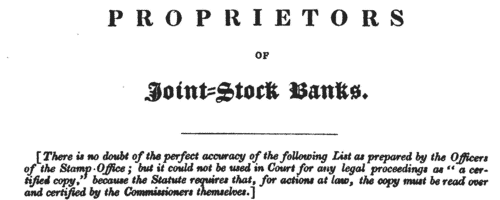
| Boys entering Harrow School
(1853)
This First Volume of the Second Series of the Harrow School Register was edited by J. H. Stogdon and published in 1925. The boys are listed by term of entrance, and then alphabetically by surname and christian names (in bold). Next, in brackets and in italics, is the school house to which he belonged - or, H. B. indicating a day boy whose family lived in Harrow. Stogdon then gives the father's surname and initials, and address. In cases where the boy was prominent in sports at school, or won academic prizes, scholarships &c., that is given; then the year of leaving the school; and a synopsis of his career, so far as known.
BILL. Cost: £4.00.  | Sample scan, click to enlarge
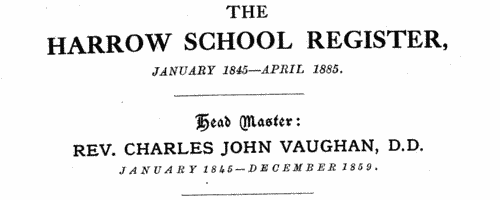
| Proprietors of the Bank of England
(1838)
M. A. Marchant of London published this alphabetical list of names and addresses of proprietors of the Bank of England holding £1000 stock and upwards. The number of votes possessed appears against each name; a holder of £4000 had four votes, and no one could have more. BILL. Cost: £4.00.  | Sample scan, click to enlarge
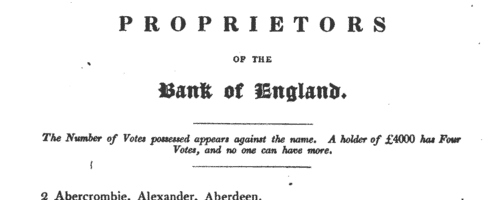
| Electors for Thurstonland
(1848)
On 14 and 15 December 1848 an election took place for a Knight of the Shire for the West Riding of Yorkshire in the House of Commons. The candidates were Edmund Denison and sir Culling Eardley Eardley, gaining 14,743 and 11,795 votes respectively. The county franchise at this period included freeholders of land worth 40s or more a year; £10 copyholders and long-leaseholders; and £50 short-leaseholders and tenants. This poll book was published in 1849.
Former poll books had been compiled from the sheriff's returns; but as these were now transmitted to the Home Office immediately after an election, in this instance the polling was marked from the check-clerk's returns, carefully compared with the registers marked in the poll booths at the time of voting.
The votes for the respective candidates are indicated by the numerals 1 (Denison) and 2 (Eardley). The omission of these numerals indicates that the elector did not vote. Many names which appear on the register of particular townships are completely omitted in this poll book: in all these cases, the same name will be found recorded in some other township, the elector having two or more qualifications. In such cases, his name only appears in the poll book in the actual township for which he chose to vote; or, if he did not vote at all, in that township for which he was qualified that lay closest to his actual residence.
The townships are arranged alphabetically within polling district; and within each township the names are arranged alphabetically by surname and christian name, and the elector's residence is given. Many of the electors resided outside the township for which they were qualified - some in other counties. Moreover, at the end of each polling district there is a list of persons registered to poll in that district, from townships is other districts. BILL. Cost: £6.00.  | Sample scan, click to enlarge
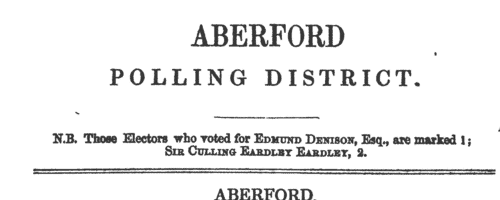
| Boys entering Haileybury College, Hertfordshire
(1926)
Haileybury College, near Hertford, was founded by the East India Company in 1806, and incorporated by Royal Charter in 1864. This register of pupils entering the school from 1862 to 1931 was edited by a master there, Laurence Arthur Speakman. The boys are listed by term of joining the school, and then alphabetically by name (in bold), surname first (in capitals). There is then usually a precise birthdate, and the name and address of his father; his period at the school, starting with abbreviations to indicate the house to which he belonged (B., Batten; B. F., Bartle Frere; C., Colvin; E., Edmonstone; Ha., Hailey; Hi., Highfield; L., Lawrence; Le B., Le Bas; M., Melvill; Th., Thomason; T., Trevelyan), and the first and last forms attended (e. g., IV., fourth form). Where a member of a school team there is then an indication (e. g., XI., cricket).
BILL. Cost: £4.00.  | Sample scan, click to enlarge
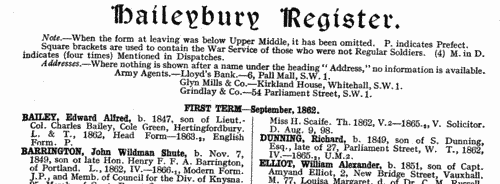
| Boys entering Haileybury College, Hertfordshire
(1928)
Haileybury College, near Hertford, was founded by the East India Company in 1806, and incorporated by Royal Charter in 1864. This register of pupils entering the school from 1862 to 1931 was edited by a master there, Laurence Arthur Speakman. The boys are listed by term of joining the school, and then alphabetically by name (in bold), surname first (in capitals). There is then usually a precise birthdate, and the name and address of his father; his period at the school, starting with abbreviations to indicate the house to which he belonged (B., Batten; B. F., Bartle Frere; C., Colvin; E., Edmonstone; Ha., Hailey; Hi., Highfield; L., Lawrence; Le B., Le Bas; M., Melvill; Th., Thomason; T., Trevelyan), and the first and last forms attended (e. g., IV., fourth form). Where a member of a school team there is then an indication (e. g., XI., cricket).
BILL. Cost: £4.00.  | Sample scan, click to enlarge
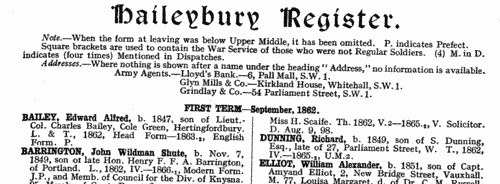
|  Men of the 21st Regiment of Foot (Royal Scots Fusiliers) fighting in South Africa
(1877-1879) Men of the 21st Regiment of Foot (Royal Scots Fusiliers) fighting in South Africa
(1877-1879)
What is commonly called the Zulu War Medal was awarded to those British soldiers who fought in a series of conflicts in southern Africa from 1877 (the Kaffir War) through to 1879 (the Zulu War). In 1880 the various units submitted returns of the officers, non-commissioned officers and men 'entitled to the Medal for Military Operations in South Africa during 1877-8-9' and these 'medal rolls' are now in the National Archives. The returns are made with the information arranged in twelve columns:
1. Rank and name
2. Regimental number and rank at the time the medal was earned
3. Whether in possession of medal for previous wars
4. Whether engaged against the Gaikas, Galekas and other Kaffir tribes 1877-8
5. Whether engaged against Pokwane 1878
6. Whether engaged against the Griquas 1878
7. Whether engaged against the Zulus 1879
8. Whether engaged against Sekukuni as set forth in Par. 2. G. O.
9. Whether engaged against Moirosi's stronghold
10. Entitled to medal without clasp under Par. 4.
11. Serving with regiment, depot, dead, discharged, deserted, &c.
12. Notes and cross-references to the Adjutant-General's medal lists.
WO 100/46.
BILL. Cost: £8.00.  | Sample scan, click to enlarge
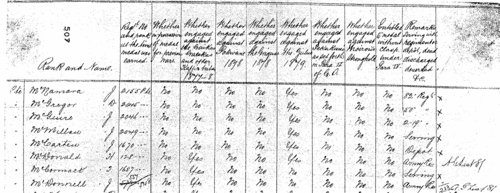
|
Research your ancestry, family history, genealogy and one-name study by direct access to original records and archives indexed by surname.
|













